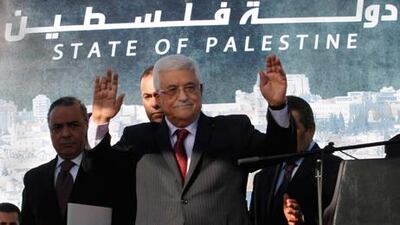RAMALLAH //What's in a name? A lot, according to Mahmoud Abbas, the West Bank's Palestinian president and many Palestinians.
Which is why he changed the name of the Palestinian Authority (PA) to the "State of Palestine".
Those three words will be emblazoned on official documents, such as passports and drivers' licences.
But the move may do more than just boost Palestinian confidence.
By opting for form over substance, it poses a political risk, one that could be seen as a mere public relations gesture that could underscore the wide gap between rhetoric and reality or, worse, incur painful Israeli retaliation.
Instructing government institutions on Sunday to phase out the "Palestinian Authority" insignia, Mr Abbas's decision follows his successful bid last November to upgrade Palestinian status at the United Nations.
Now everything from official stationary and stamps to insignia on Palestinian foreign missions will bear this new symbol of statehood.
"We need to have a serious discussion with this sort of decision," Shawan Jabarin, director of Al Haq, a human-rights organisation in the Palestinian administrative capital of Ramallah, said.
Although not opposed to the idea, he expressed concern about potential "legal and political complications" and a "lack of clarity that needs to be sorted out".
The purpose, Mr Abbas explained, was to "build" the Palestinian state and enhance Palestinian "sovereignty over the … land".
Yet the parameters of the decree are vague.
Mr Abbas and his leadership run a state in name only. Israel retains ultimate control over the West Bank and the desired Palestinian capital of east Jerusalem, which Israel formally annexed.
Gaza is administered by their Islamist rivals in Hamas, who may simply refuse to obey Mr Abbas's decree, which was signed on Thursday.
And then there are the refugees.
"Does the new 'State of Palestine' passport include Palestinians living outside of Palestine, like refugees in Lebanon?" asked Mr Jabarin.
Because it was the Palestine Liberation Organisation (PLO), which was upgraded to an observer state at the UN last year, this could mean both the about 4.6 million Palestinians in the Israeli-occupied territories and millions of refugees abroad could potentially receive one, Mr Jabarin added.
The UN recognises the PLO, also headed by Mr Abbas, as the "sole legitimate representative of the Palestinian people".
The new "State of Palestine" passports could be interpreted as complicating what refugees call their right to return to homes in Israel that they or their ancestors left during the time of Israel's creation in 1948.
Saeb Erekat, an aide to Mr Abbas and member of the PLO's powerful Fatah faction, said officials were still studying the passport issue.
He emphasised, however, that the president's name-change decree would keep hope alive for the "the two-state solution, based on the [internationally recognised] 1967 borders, with a Palestinian state living side-by-side with Israel".
Many fear Israel has destroyed a viable Palestinian state by covering its land with Jewish settlements. This included a flurry of new settler homes announced after Mr Abbas's statehood victory - punishment for the UN measure, which Israel and the United States opposed.
An Israeli official did not dismiss the possibility of Israel refusing "State of Palestine" documents. This could be used to block travel through Palestinian border crossings, which Israel controls, the official said.
Israel still wields vetting power over Palestinian identity cards as part of the interim arrangements of the 1993 Oslo peace process, which Palestinians had hoped would have yielded them their own state years ago.
Jonathan Schanzer, vice president for research at the Foundation for Defence of Democracies, a think tank in Washington, said that Mr Abbas's decree could be interpreted as the end of the Oslo peace process because, in part, it "throws the legal status of the Palestinian Authority into limbo".
The PA was created by the Oslo process but he said there "is no legal framework for the 'State of Palestine'."
Daniel Sumrain, 46, acknowledged all the risks involved with the Palestinian name change. But the general manager of a legal-translation business in central Ramallah yesterday said it was worth it.
"We deserve our own state, and the international community recognises this because they have recognised the State of Palestine," he said. "So why can't we call it what we want?"
Follow
The National
on
& Hugh Naylor on

